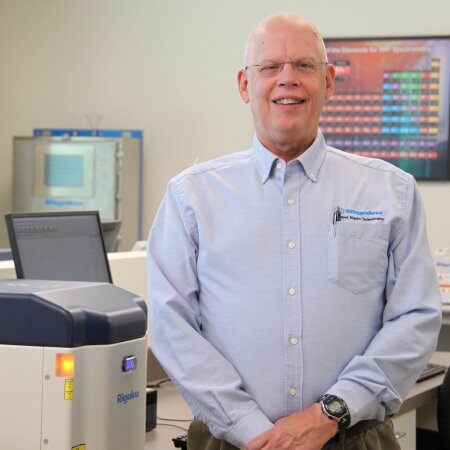Application Note EDXRF1943

Scope
The measurement of Pt, Rh, and Pd in recycled automotive catalytic converters is demonstrated using Fundamental Parameters (FP) approach and pre-installed starter Matching Library as the Rigaku Auto Cats-Pak.
Background
Used catalytic converters are collected and recycled in order to reclaim the precious metals Pt, Rh, and Pd. Typically, the entire honeycomb core is removed and ground into a powder. Once in powder form, the precious metal catalysts can be extracted, or the powder can be sold to a refiner.
The honeycomb core, also called the monolith, is typically ceramic, containing combinations of the elements Al, Si, Fe, Zn, Sr, Zr, Ba, La, and Ce. Some cores can be made of a stainless-steel honeycomb and so would contain higher Fe and other metals. Catalyst material may also be high in Pb content in regions where leaded gasoline is still used. Because all of these elements can occur at various levels, Rigaku’s software offers quick, direct analysis and easy use for crafting individual methods as desired.
NEX QC+ QuantEZ gives the user flexible FP templates for crafting specific methods and Matching Libraries for optimum accuracy of specific materials. The versatile software of the NEX QC+ QuantEZ also allows for semi-quant screening of totally unknown samples without any reference material in a library.
Fundamental parameters & matching library
For screening purposes, Fundamental Parameters (FP) is used, which calculates concentration based on X-ray theory. A factory-installed Matching Library for mixed, homogenized materials is included with the analyzer, using twelve samples that have been fire assayed, including two certified NIST standards. FP uses the assayed values and measured information to more closely match theoretical intensities to measured intensities, thus providing a more accurate model of the real matrix and match the XRF to the referee values, either fire assay or ICP.
The software is simple and intuitive, allowing the user to expand on the starter Matching Library, or design new Matching Libraries to suit various specific converter materials or families. Empirical calibrations can also be crafted in order to ensure the optimum accuracy for a specific material type.
The factory starter Matching Library covers the following ranges for Pt, Pd, and Rh.
| Element | Concentration range |
| Pt | 400 – 6230 ppm |
| Pd | 260 – 6445 ppm |
| Rh | 0 – 365 ppm |
 Typical factory Matching Library for Pt matching XRF intensities to fire assay values
Typical factory Matching Library for Pt matching XRF intensities to fire assay values
Results – Certified Reference Material ERM EB504
The European reference standard ERM EB504E was measured as a check sample, not part of the factory starter Matching Library. Typical recovery is <10% relative in accordance with potential error in ICP or fire assay values.
| Sample ID: ERM-EB504E Units: ppm | ||||
| Element | Certified Value | NEX QC+ Result | % Deviation | Stat. Error |
| Pt | 1777 | 1742 | 2.0% | 6.0 |
| Pd | 279 | 285 | 2.2% | 1.4 |
| Rh | 338 | 341 | 1.0% | 1.6 |
Discussion
The Rigaku Auto Cats-Pak includes the factory starter Matching Library for general, mixed and homogenized auto cats and also includes a small supply of the ERM certified check standard.
To meet various analytical needs at various sites, the Rigkau QuantEZ® software is versatile and simple to use. The starter Matching Library can be augmented with additional standards from the site for mixed, homogenized cats, and the Matching Library software allows the user to easily build specific methods by grouping cats into families. For example, a family for European cats, another for Asian cats, or a separate method for US cats. Families of auto cats are typically determined by the other ceramic and metal elements in the powder, such as a specific family for silicon carbide cats.
The versatile software also allows for empirical best-fit calibration using a large set of accurately assayed material, giving the site several ways to craft methodology to meet the specific analytical needs of the facility.
Conclusion
Determination of the precious metals content of recovered catalytic converter cores is critical to assessing the valuations needed in this specialized business within the automotive recycling stream. The NEX QC+ QuantEZ® FP software allows for more versatile expansion or design of methods and libraries, as well as standardless analysis capabilities for screening. Thus, the Rigaku NEX QC+ QuantEZ®, with its simple yet advanced software, provides an easy-to- use and valuable tool for the catalytic converter recycling industry.

